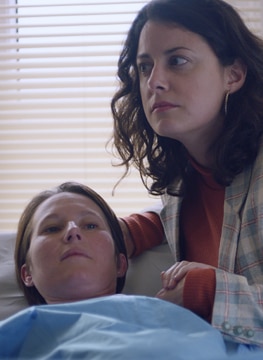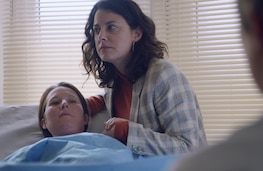

The silence around women’s health and intimate experiences is astounding. Nearly two thirds of people agree that these issues are not talked about openly, which is a big problem.
Here at Bodyform, we are always striving to break taboos and help women live fearlessly. As part of our #wombstories campaign, over 1,000 people in the UK took part in our research study1 to uncover the unknown on women’s bodies.
Here are the fascinating results…
Our #wombstories research survey revealed that less than half of all people are comfortable talking about women’s health issues. This needs to change. Being unable to talk about these issues can have a significant impact on both society as a whole and individuals.
In fact, 44% of women felt that their mental wellbeing was negatively impacted as a result of not being able to openly share their experiences with their bodies and almost half (46%) say that societal judgement made them feel they had to keep the situation secret.
The opposite of silence is sound, and the only way to combat the silence is to begin talking about it. There’s some truth behind the saying ‘a problem shared is a problem halved’. It’s the reason why 68% of women say being open with family and friends helps, and 59% advise sharing experiences to help normalise conversation around taboo topics like miscarriage, endometriosis, perimenopause, menopause and fertility issues.
We found out that 40% of people would like to be able to talk more openly about women’s intimate experiences that affect them. The following findings are a good start, and can be used as a way to begin the conversation.
More than 800 million people menstruate every single day2. So why is there so much shame around talking about it?
Our survey revealed that this starts right from a woman’s very first menstrual cycle. After getting their first period, 48% of women felt embarrassed, 30% felt lonely and 41% feared people at their school finding out. Meanwhile, 57% of women told fewer than 5 people when they started their period, showing that they stayed close to their inner circle of friends and family with this menstrual milestone.
Even as we grow past puberty, it doesn’t get any easier to talk about. It turns out that 41% of women feel they will be labelled for ‘over sharing’ if they talk about an everyday period occurrence such as leaking, coming on or experiencing a sudden rush of blood. Half of women feel they need to hide their menstrual products in the workplace – that’s a lot of ultra towels needlessly shoved up sleeves in shame.
At a certain point, women stop menstruating as the effects of perimenopause lead up to eventual menopause. A third of women tried to keep this natural change a secret and instead suffered with their symptoms in silence, with 41% worrying they would be perceived as ‘old’.
Sometimes it can feel like the world is judging women’s choices on these matters. Whether it’s questions from family members about when you’re going to have children, or the expectations around giving birth and parenting in a certain way, the pressure can cause women to keep quiet about their experiences.
Whether or not you decide to have children is a personal decision, or at least it should be. Sadly, 44% of women who are child-free by choice feel that people are constantly trying to change their mind, while 40% feel misunderstood and 48% feel strongly judged by society. When people did speak out about it publically, 40% felt belittled.
Fertility is one topic that isn’t often discussed, even though 1 in 7 UK couples find it difficult to conceive.3 Despite so many people going through fertility issues, there can be a sense of shame around having to undergo fertility treatment. Our survey revealed that 45% of people felt like others pitied them for having fertility treatment. Due to the stigma of going through treatments like IVF, we found that 42% of people tried to keep their fertility treatment as secret as possible.
The secrecy around childbirth can also do a lot of damage, particularly in the unfortunate cases where miscarriage occurs. Many women choose not to announce their pregnancy until after having their 12 week scan. As a result of this secrecy, of the women we surveyed who had sadly experienced a miscarriage, 39% said they couldn’t grieve openly without fear of judgement. While some grieving mothers feel like they can’t speak about their miscarriage, just under half felt that people also avoided asking them about it. But 53% said talking openly about it helped.
There are many issues that don’t get the attention they deserve, particularly ones that involve women’s bodies and the V-Zone. Despite endometriosis being a condition that impacts 1 in 10 women worldwide4, we found that only a quarter of people know anything about it. Of people that suffer with it, 53% feel embarrassed to discuss the pain, 53% feel their pain complaints aren’t listened to and 52% try to keep what they’re going through a secret as much as possible. Sadly, this contributes to the reasons why it takes on average 7.5 years to get properly diagnosed.5
It’s not just women’s physical health that gets impacted. Women’s choices are often judged unfairly by others, which can affect women’s body image, self-confidence and mental health. When we asked women about sex, 55% agreed women are judged more harshly than men for discussing sexual pleasure, with 47% of men agreeing. Further, 1 in 5 women who have told others they enjoy having sex have been told they are promiscuous.
We want to empower women to be free to make the right choices about their own bodies, and be able to discuss both the pain and the pleasure, without fear of judgement.
The findings show that there is still more work to be done to make women’s voices heard. Thankfully, there’s many ways to break the silence. You can find all the information you need on the V-Zone section of the Bodyform website to educate yourself and share with others.
The first step is to start talking about it. So let’s share our #wombstories far and wide, and continue to live fearlessly in every way we can.
We believe that our #wombstories need to be heard. Watch our video, share your story and post on social using #wombstories.
Sources:
1 #Wombstories research survey by Dynata ~ 08 April 2020
2https://www.globalcitizen.org/en/content/period-poverty-everything-you-need-to-know/
3https://www.nhs.uk/conditions/infertility/
4https://www.nhs.uk/conditions/endometriosis/treatment
5https://www.endometriosis-uk.org/news/it-takes-average-75-years-get-diagnosis-endometriosis-it-shouldnt-37491
